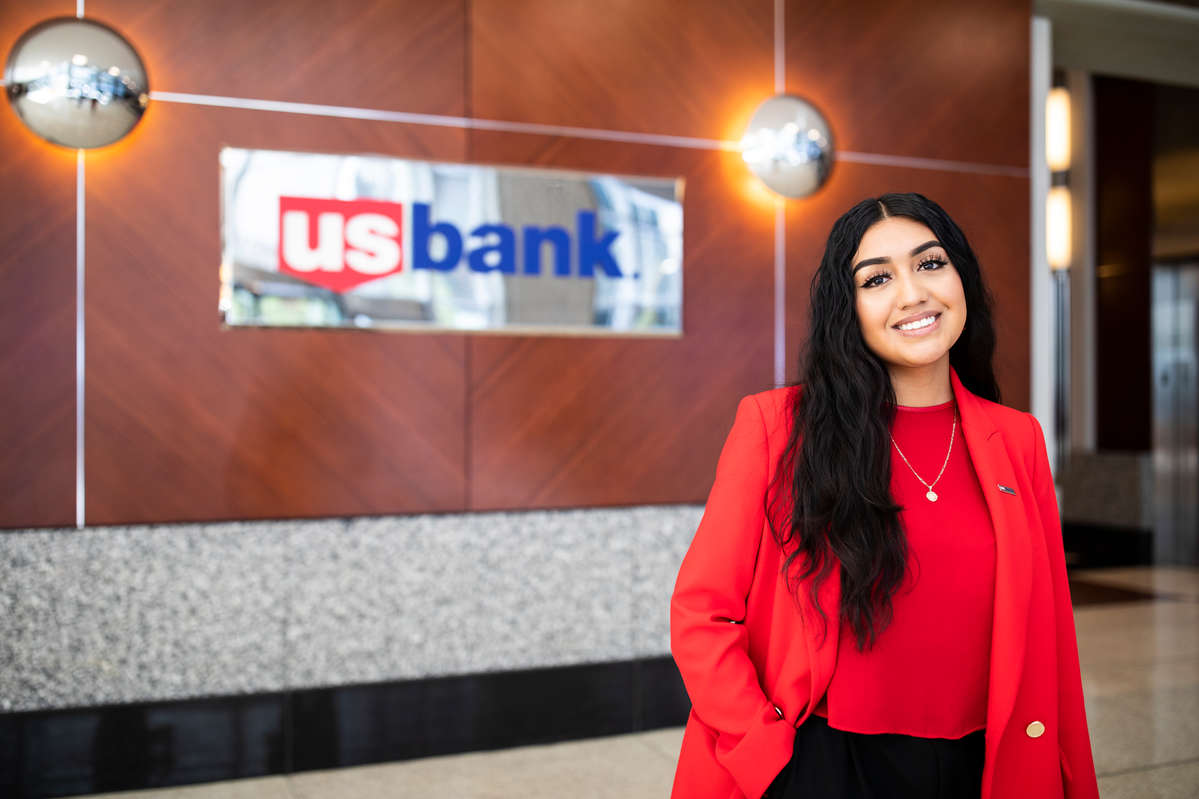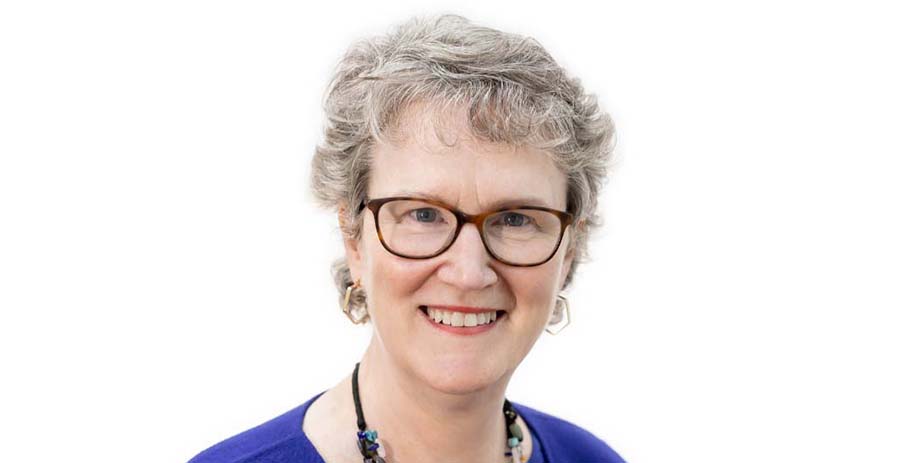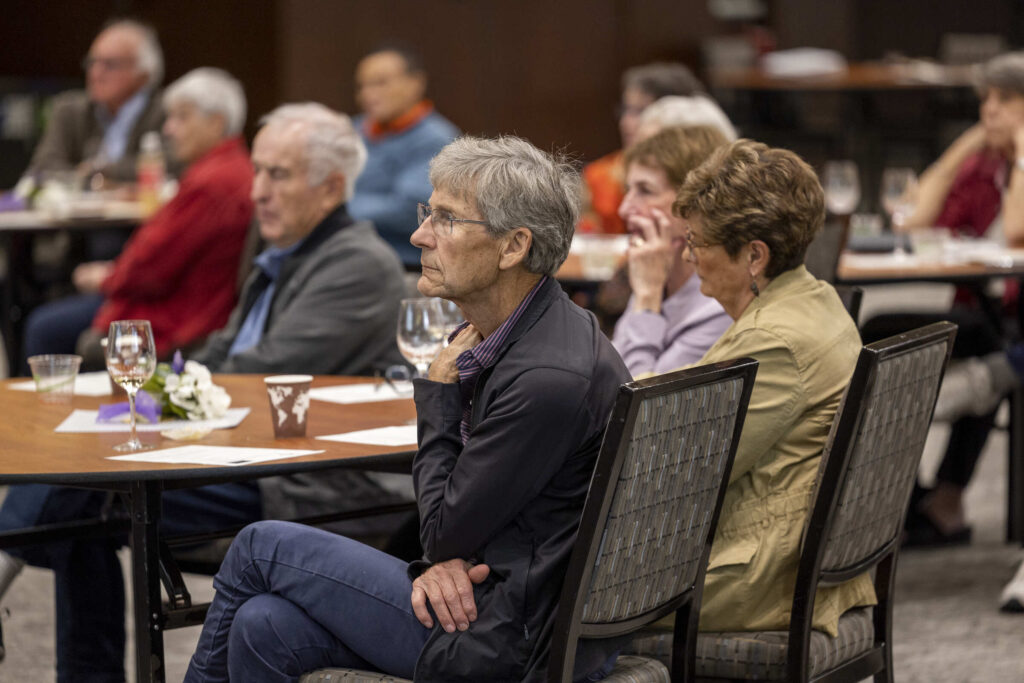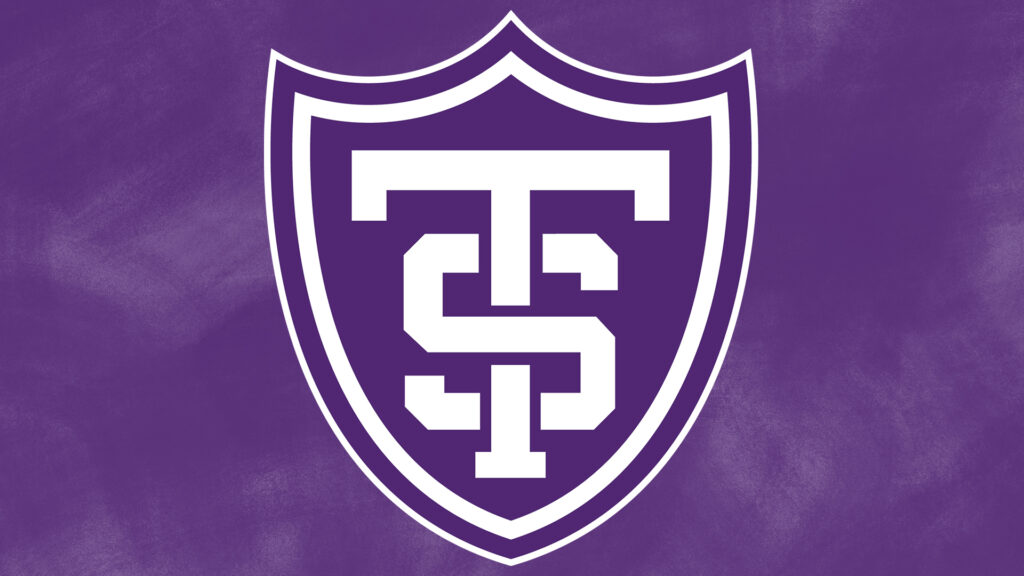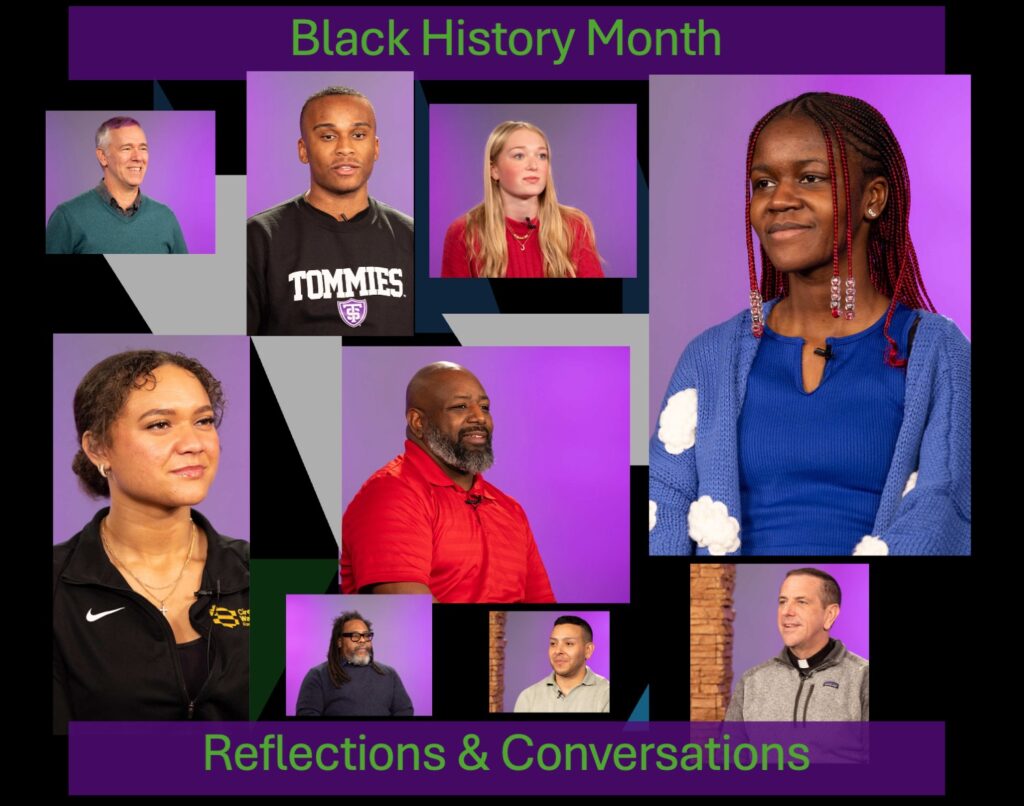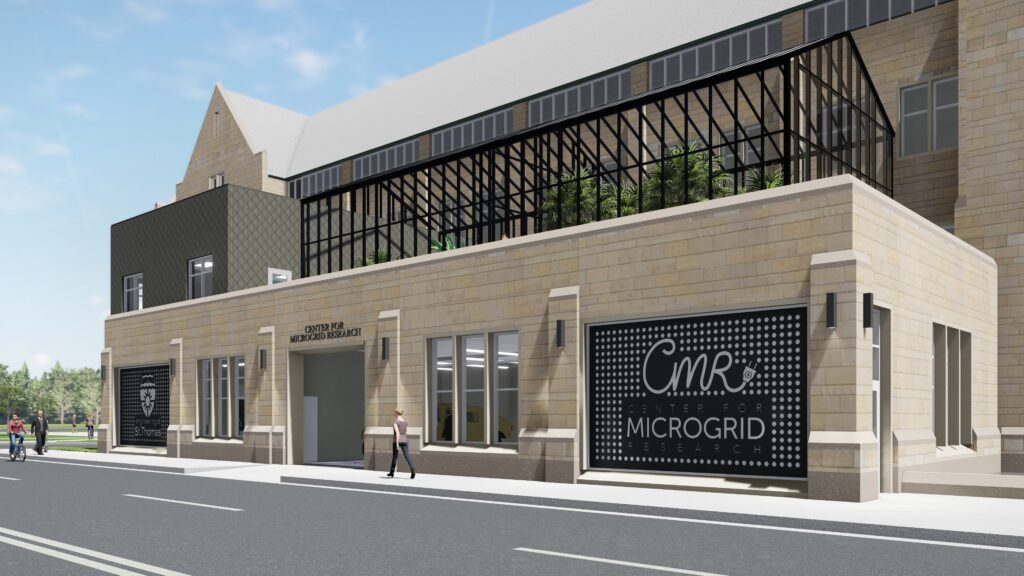As a diversity, equity and inclusion intern at U.S. Bank, Jasmin Sanchez has found a passion for working in social corporate responsibility. The Dougherty Family College (DFC) sophomore is in her second year interning at the company, where she offers her unique perspective and is encouraged to be herself.
“I am grateful for the opportunity of being able to bring my authentic self to work,” she said. “My identity allows me to bring in an insight only I know. And I can leverage that in the work I do to advance the potential of the diverse workforce at the bank.”
The U.S. Bank internship has put Sanchez on the front line of planning events, including coordinating the company’s booth at the Forum on Workplace Inclusion. She takes pride in seeing those projects come to life. Although she’s now doing her work at a distance during the pandemic, she knows her U.S. Bank experience is preparing her for the corporate culture she hopes to be a part of when she enters the workforce after college.
“The biggest thing I've learned at the bank is how teamwork is heavily implemented in all aspects of work,” she said. “I enjoy how much we invest in teamwork because it allows everyone to bring a unique perspective to the projects.”
The workforce shortage
In the 2020 State of the University address, St. Thomas President Julie Sullivan said, “By 2027, about 70% of jobs in our nation will require at least a four-year college degree. And for Minnesota, that percentage is even higher. We want the holders of these jobs to represent the rich diversity of our state.”
Sullivan went on to say DFC alumni will “play an important role in enhancing the future workforce of our region.”
DFC offers a two-year associate degree as part of a pathway to a four-year college degree. With DFC focused on closing the opportunity gap for students of color, its Professional Internship Program is helping create a diverse workforce pipeline by giving employers access to a group of talented and motivated DFC students, of whom 95% are people of color.
Alvin Abraham, founding dean and the Eugene and Mary Frey Endowed Chair of DFC, said the paid internship program was part of the college’s design from the beginning. It allows students to take their classroom experiences and apply them to real-world experiences. It also helps them explore career options.
Internships allow students to dream bigger than what they could have ever imagined a career may have looked like for them, he said.
“As we were building the college, we were hoping to be a part of the solution for two things: the college degree attainment gap and the workforce shortage our community is facing,” Abraham said. “Ultimately, our goal is for all DFC students to graduate with four-year degrees. A large part of helping students on that journey is providing clarity on intended majors and what careers their degrees may lead to. We believe the internship plays an integral part in supporting students to solidify their academic plans and begin to dream about future careers.”
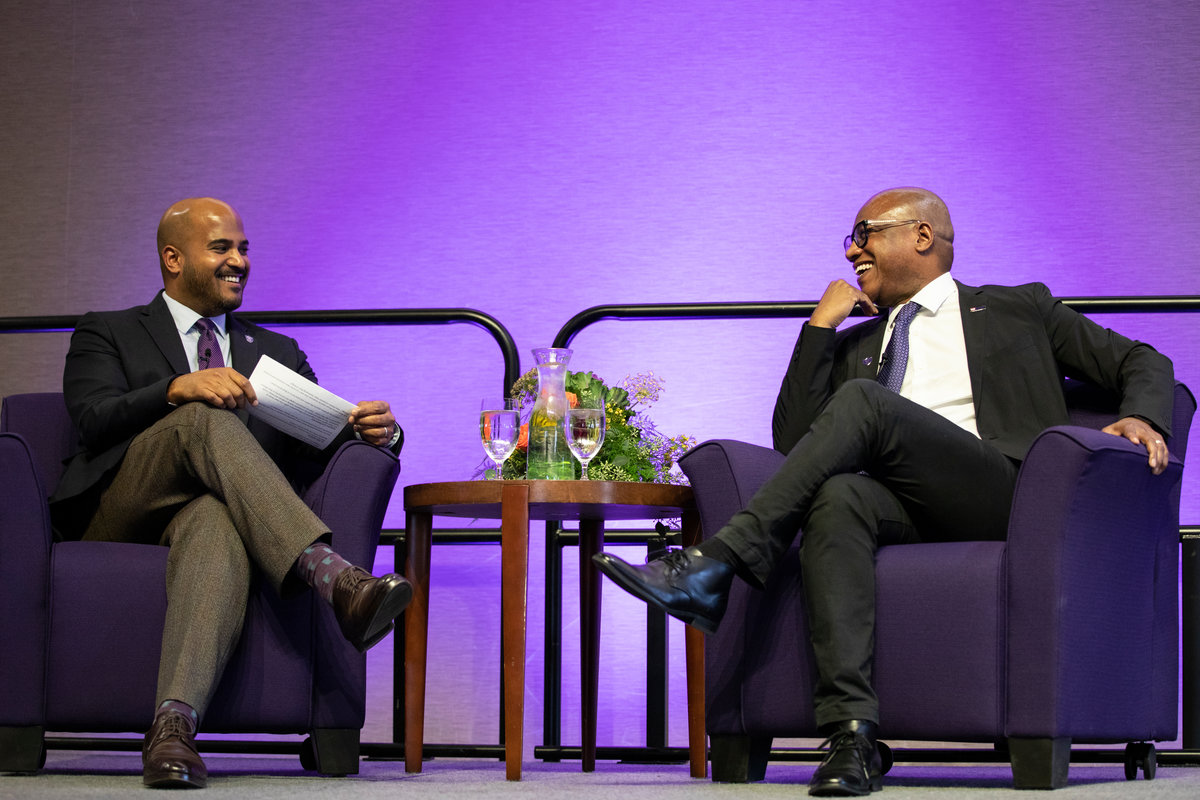
Alvin Abraham, left, dean of the Dougherty Family College, and Greg Cunningham, VP and head of diversity and inclusion at U.S. Bank, have a fireside chat style discussion during the First Friday Speaker Series. Liam James Doyle/University of St. Thomas
U.S. Bank employs the most DFC interns
U.S. Bank was one of the first companies to sign on as a corporate DFC sponsor prior to its launch in 2017. During spring semester, four sophomores and 10 first-year students at DFC were interning with the company. Even throughout the COVID-19 pandemic, they continued to employ all of these interns. U.S. Bank Chief Executive Officer and St. Thomas Trustee Andy Cecere ’82 was critical to the relationship starting and expanding so quickly.
“Andy was trying to determine what role he could play from a leadership perspective in helping to close some of the educational and achievement gaps,” said Greg Cunningham, U.S. Bank senior vice president and chief diversity officer, who is on the DFC advisory board. “He felt like this program was one way that both he personally and the organization could get involved indirectly driving outcomes.
“It's not enough to just give money,” Cunningham said. “You have to be intentional about how you support and how you lift young people up. We not only talk the talk, but we wanted to walk it as well.”With students possessing a multitude of untapped potential, Cunningham said, it’s up to partnering organizations to figure out how to use as much of that as possible. Students should be in an environment where they can demonstrate the full breadth of their gifts.
“They’re so incredibly smart and nimble,” Cunningham said. “They're fighters and they bring such a unique and fresh perspective to the work we do. We’ve had interns here I wish I could hire right on the spot because they come in with such a sense of purpose and a sense of optimism about the world that they are about to inherit. These kids are far more prepared than I was at their age. They have a sense of empathy and a global grounding of their place in the world that’s going to be a catalyst for change in how companies and how businesses interact in the future. They’re changing and reshaping the role that businesses play in solving social issues.”
Cunningham said U.S. Bank has greatly benefited from younger people of color bringing their skills to the company.
“We want to encourage a climate and a culture that allows them to bring their whole self authentically to it,” he said. “For U.S. Bank to see that and for people here to see that this is what leadership looks like in the future, that’s the real benefit for us. That mold of what we think leadership is, who has it and what it looks like is completely shattered. Embracing, cultivating, supporting and encouraging – that is how we’ve benefited.”
Preparing for a professional environment
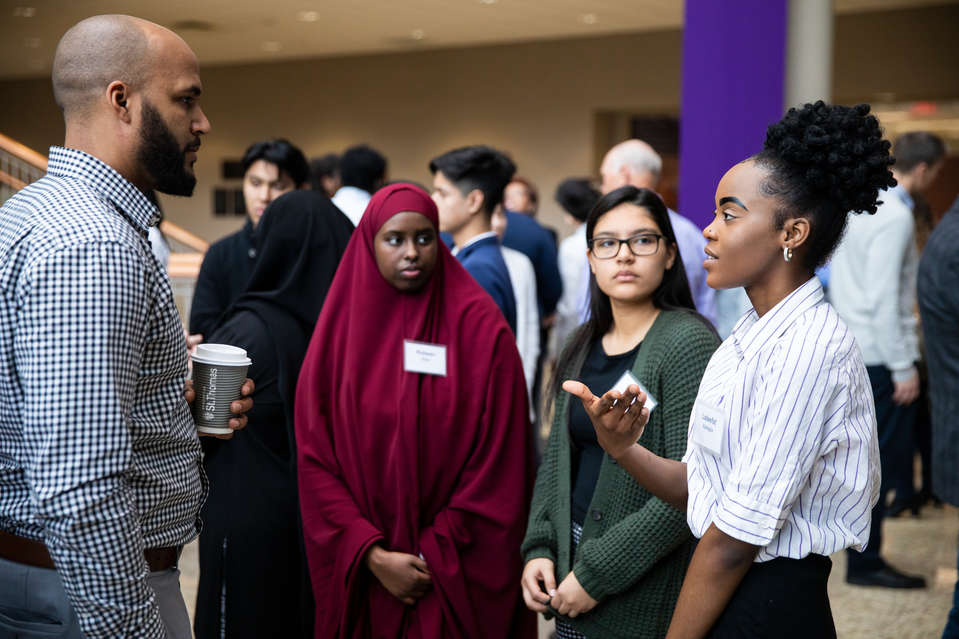
Students of the Dougherty Family College network with community business leaders from various companies during an event held in the School of Law’s main atrium on November 21, 2019.
Sanchez is a great example of a student who has excelled in her internship, said Kris Donnelly ’93, director of the DFC’s Professional Internship Program. Within two months of starting at U.S. Bank, Sanchez was helping coordinate the company’s booth at a major event and leading their vendor meetings with minor supervision.
“Those types of opportunities, that exposure is typically unheard of in a college program,” Donnelly said.
For first-year DFC student Lisan Hasnain, working at U.S. Bank as part of the User Experience team has enhanced his college skills. Hasnain, who is blind, said before his internship, he considered accessibility in terms of his own needs; now he examines it from multiple angles.
“I bring unique insight as a student and I bring new ideas based on my current classroom experiences,” Hasnain said. “The environments of both U.S. Bank and the University of St. Thomas have forced me to think outside the box, which pushes me outside my comfort zone.”
Through his internship, he helps ensure digital accessibility throughout U.S. Bank.
“My goal is to become a native web developer with a key focus on accessibility,” he said. “My internship is teaching me what it really means to code for accessibility.”
To prepare for their internships and the professional environment, DFC students take a semester of professional development courses and activities. Students work on creating their “elevator pitch” to introduce themselves and gain confidence in public speaking. They also participate in mock interviews, learn from guest speakers about various industries and hear from affinity groups about being a person of color in a predominantly white professional environment.
“I want the students to be prepared to be successful,” Donnelly said. “I often tell them my goal through a lot of these activities and events is in some way to make them as uncomfortable as I can in the classroom setting so that when they get to work they’ll say, ‘I can handle this; I can do anything.’”
Successful intern partnerships
U.S. Bank’s Cunningham sees himself in many of the DFC students he has met. He grew up in the housing projects in Pittsburgh, but his mother sent him to a private school when he was a child. That was his ticket out, he said. Without education, he wouldn’t have two college degrees and have worked for three Fortune 500 companies.
“It’s going to take a lot of hard work and you have to do the work,” he said. “I think that’s what is important about these kinds of programs – this is not about a handout or creating favor for anybody. It’s about creating parity of opportunity. You can put an opportunity in front of somebody, but if they don’t take it and run with it, then they’re not going to be successful. What I’m excited about is that I can be involved in helping present an opportunity for those who want it, those who are willing to work hard and have dreams of doing better for themselves and their family. We can provide that opportunity. That is our responsibility.”
Abraham calls U.S. Bank an “incredible” partner and DFC students have had a “phenomenal” intern experience at the company. The partnership is a gold standard when it comes to best practices for the student experience.
“We have several DFC graduates who are still working at U.S. Bank,” Abraham said. “That’s a testament to their commitment to our students, their belief in our program and their understanding of this partnership as a long-term solution to the talent needs of their organization.”
When asked why he thinks companies should support the DFC internship program, Cunningham said they have a moral obligation as corporate citizens of the community. In addition, he said, these students are the workforce of the future.
“We’re about to complete a 2020 census,” Cunningham said. “It’s going to be a powerful reawakening around the changes that have already happened. The workforce of the future is going to be much browner than it is today. If you’re not preparing these kids to be successful and you’re not ensuring that they have the skills to perform the jobs of the future, then you as a business are going to suffer. And so, if you want to reach your full potential as an organization how could you possibly not want to ensure that all of our young people are skilled appropriately to meet the challenges that are in front of us?”
Abraham said when they were in the DFC planning stages, he hoped the community would be excited about the college and its students. The success of the internship program with partner companies is just one way people are showing they share that enthusiasm.
“We’re not going to fit into a traditional internship model at most organizations,” Abraham said. “We need organizations that are willing to think outside the box to get access to this remarkable group of students earlier than their junior or senior year. Our partners are forward thinking, open to doing things differently, and think about talent in innovative ways.”
“The fact that in less than three years, we have built a cadre of partners to help support our students in internships is a testament to how incredible this community is. Organizations have rallied alongside us to help provide solutions to the problems that exist,” he added. “They’re doing so philanthropically and through a mission-driven lens. Our internship partnerships have played an enormous role in our success as we’ve gotten off the ground and will continue to play an important role as we build and grow the organization.”
DFC: Lead corporate sponsors
- U.S. Bank
- 3M
- Delta Air Lines
- Dougherty Financial Group
- Mayo Clinic
- SPS Commerce
Supporting corporate sponsors
- Hubbard Broadcasting
- RBC Wealth Management
- Ryan Companies
- Target
